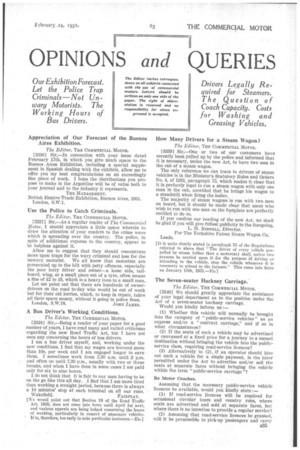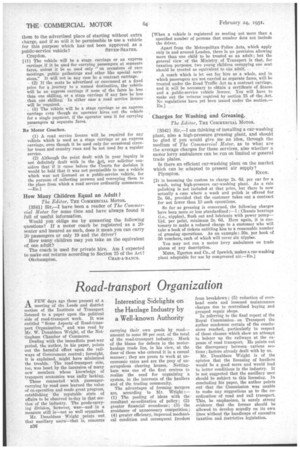OPINIONS and QUERIES
Page 69

Page 70

If you've noticed an error in this article please click here to report it so we can fix it.
Our Exhibition Forecast. Let the Police Trap Criminals—Not Unwary Motorists. The Working Hours of Bus Drivers. Drivers Legally Required for Steamers. The Question of Coach Capacity. Costs for Washing and Greasing Vehicles.
Appreciation of Our Forecast of the Buenos Aires Exhibition.
The _Editor, THE COMMERCIAL MOTOR.
[3336] Sir,—In connection with your issue dated February 17th, in which you give much space to the Buenos Aires Exhibition, including a special supplement in Spanish dealing with the exhibits, allow me to offeryou my best congratulations on an exceedingly fine piece of work. I hope the distributions you propose to Make in the Argentine will be of value both to your journal and to the industry it represents.
THE MANAGEMENT,
British Empire Trade Exhibition, Buenos Aires, 1931. London, S.W.1.
Use the Police to Catch Criminals.
The Editor, THE COMMERCIAL MOTOR.
[3337] Sir,—As a regular reader of The Commercial Motor, I should appreciate a little space wherein to draw the attention of your readers to the crime wave which is spreading over the country. The police, in spite of additional expense to the country, appear to be helpless against it.
Allow me to suggest that they should concentrate more upon traps for the wary criminal and less for the unwary motorist. We all know that motorists are persecuted up to the hilt with petty offences, especially the poor lorry driver and owner—a loose side, tailboard, wing, or a small piece out of a tyre, often means a fine of £2 to £3, which is a heavy item to a small man.
Let me point out that there are hundreds of ownerdrivers on the road to-day who would be out of work but for their old lorries, which, to keep in repair, takes all their spare money, without it going in police fines.
London, S.W.18. JOHN JAMES.
A Bus Driver's Working Conditions.
The Editor, THE COMMERCIAL MOTOR.
[3338] Sir,—Being a reader of your paper for a good number of years, I have read many and varied criticisms ,regarding the new Road Traffic Act, -but I have not seen any concerning the hours of bus drivers.
I am a bus driver myself, and, working under the new conditions, I find that my wages are lowered more than 10s. per week and I am engaged longer to earn them. I sometimes work from 5.30 a.m. until 3 p.m. and often on until 7.30 p.m., usually with two or three breaks, and when I have done in some cases I am paid only for six to nine hours.
I do not think that it is fair to any man having to be on the go like this all day. I find that I am more tired than working a straight period, because there is always a 10 minutes' stop at each terminal on all our runs.
Wakefield. FAIRPLAY. [We would point out that Section 10 of the Road Traffic Act, 1930, does not come into force until April 1st next, and various appeals are being lodged concerning the hours of working, particularly in respect of Vassenger vehicles. It is, therefore, too early to note particular instances.-1-Enj How Many Drivers for a Steam Wagon?
The Editor, THE COMMERCIAL MOTOR.
[3339] Sir,—One or two of Qur customers have recently been pulled up by the police and informed that it is necessary, Under the new Act, to have two men in the cab of a steam wagon. "
. The only reference we can trace to drivers of steam vehicles is in the.Minister's Statutory Rules and Orders No. 4, of 1931, paragraph 75, which makes it clear that it is perfectly legal to run a steam wagon with only one man in the cab, provided that he brings his wagon to a standstill, when firing the boiler.
The majority of steam wagons is run with two men on board, but it should be, made clear that users who wish to run with one man on the footplate are perfectly entitled to-do so. .• .
If you confirm our reading of the new Act, we shall be glad if you will give fullest publicity to the foregoing. • •
L. H. RIDDELL, Director.
Leeds. For The Yorkshire Patent Steam Wagon Co.
[It is quite clearly stated in paragraph 75 of the Regulations referred to above that "The driver of every vehicle propelled by steam (other than a motorcar) shall, untem two persons be carried upon it for the purpose Of driving or attending to the vehicle, stop the vehicle, whenever it is necessary to attend to the furnace." This came into force on January 15th, 1931.—En.] The Seven-seater Hackney Carriage.'
The Editor, THE COMMERCIAL MOTOR.
[3340] We should greatly appreciate the assistance of your legal department as to the position under the Act of a seven-seater hackney carriage.
Would you kindly inform us :— (1) Whether this vehicle will normally be brought Into the category of "public-service vehicles" as an express and/or a "contract carriage," and if so in what circumstances?
. (2) If the seats of such a vehicle may be advertised or canvassed at a fixed price for a journey to a named destination without bringing the vehicle into -the publicservice class, requiring road-service licences?
• (3) Alternatively to (2), if an operator should hire out such a vehicle for a single payment, is the hirer permitted under the Act to advertise and/or sell the seats at separate fares without bringing the vehicle within the term "public-service carriage "?
Re Motor Coaches.
Assuming that the necessary, public-service vehicle licences be available, would you kindly state :— (1) If road-service licences will be required for occasional circular tours and country runs, where seats are advertised and sold at separate fares, but where there is no intention to provide a regular service?
(2) Assuming. that road-service licences be granted,. will it be permissible to pickup 'passengers and carry B35 them to the advertised place of starting without extra charge, and if so will it be permissible tel use a vehicle for this purpose which has not been approved as a
public-service vehicle? SEVEN-SEATER.
Croydon.
[ (1) The vehicle will be a stage carriage or an express carriage if it be used for carrying passengers at separate fares, unless it be so used only '" on occasions of race meetings' public gatherings and other like special occasions."
It will not in any case be a contract carriage.
(2) If the seats be advertised or canvassed at a fixed price for a journey to a named destination, the vehicle will be an express carriage if none of the fares be less than one shilling, or a stage carriage if any fare be less than one shilling. In either case a road service licence will be required.
, (8) The vehicle will be a stage carriage or an express carriage even though an operator hires out the vehicle for a single payment, if the operator uses it for carrying passengers at separate fares.
Re Motor Coaches.
(1) A road service licence will be required for any vehicle which is used as a stage carriage or an express carriage, even though it be used only for occasional circular tours and country runs and be not used for a regular service.
(2) Although the point dealt with in your inquiry is not definitely dealt with in the .45ic1, our solicitor considers that if it came before the Courts for decision it would be held that it was not permissible to use a vehicle which was not licensed as a public-service vehicle, for the purpose of collecting persons and conveying them to the place from which a road service ordinarily commences. —En.]
How Many Children Equal an Adult ?
The Editor, THE COMMERCIAL MOTOR.
[3341] Sir,—I have been a reader of The Commercial Motor for some time and have always found it full of useful information.
Would you oblige me by answering the following questions? If a motor coach be registered as a 20seater and insured as such, does it mean you can carry 20 passengers or only 19 and the driver?
How many children may you take as the equivalent of one adult?
The coach is used for private hire. Am I expected to make out returns according to Section 75 of the Act?
Okehampton. CHAR-A-BANCS. [When n vehicle is registered as seating not more than a specified number of persons that number does not include the driver.
Apart from the Metropolitan Police Acts, which apply only in and around London, there is no provision allowing more than one child to be treated as an adult; but the general view of the Ministry of Transport is that, for taxation purposes, two young children occupying one seat should be treated as equivalent to one adult.
A coach which is let out for hire as a whole, and in which passengers are not carried as separate fares, will be treated under the Road Traffic Act as a contract carriage, and it will be necessary to obtain a certificate of fitness and a public-service vehicle licence. You will have to make out the returns required by section 75 of the-Act. No regulations have yet been issued under the Section.— ED.]
Charges for Washing and Greasing.
The Editor, THE COMMERCIAL MOTOR.
[3342] Sir,—I am thinking of installing a car-washing plant, also a high-pressure greasing plant, and should be glad if you would give me an idea, through the medium of The Commercial Motor, as to what are the average charges for these services, also whether a motor lorry ambulance can be run on limited or general trade plates.
Is there an efficient car-washing plant on the market which can be adapted to present air supply?
Plympton. Exox.
[It is becoming the custom to charge 2s. 6d. per car for a wash, using high-pressure car-washing plant. As a rule polishing is not included at that price, but there is now actually a case where a wash and polish is offered for 2s. 64., provided that the customer takes out a contract for not fewer than 13 such operations.
So far as greasing is concerned, the following charges have been more or less standardized Chassis bearings (i.e., nipples), flush out and lubricate with power pump— ]id, per point, minimum 2s. 6d. Here again, it is customary to make a reduced charge to a customer who will take a book of tickets entitling him to a reasonable number of greasing operations. As an example: 30s. per book of 50 vouchers, each of which will cover six nippl.s.
You may not run a motor lorry ambulance on trade plates of any description.
Mann, Egerton and Co., of Ipswich, makes a car-washing plant adaptable for use by compressed air.—En.]




















































































































